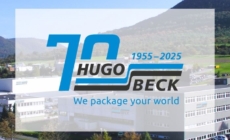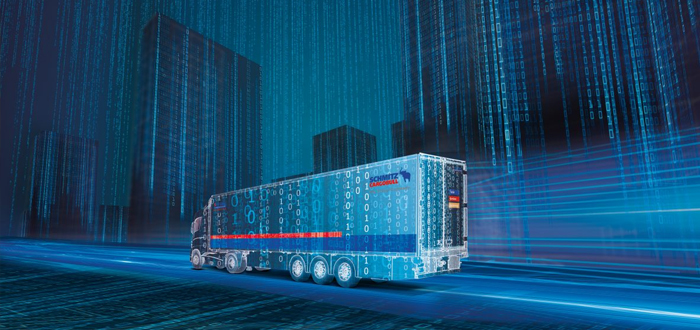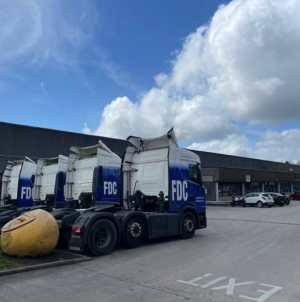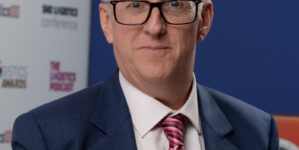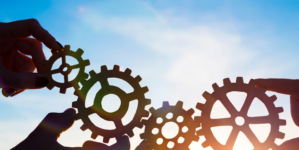-
BLACKOUT TECHNOLOGIES TARGETS TELEMATICS-INTEGRATED MOBILE DEVICE BLOCKING TO COMBAT SMARTPHONE DISTRACTION - 17 hours ago
-
OpenADR Alliance announces first OpenADR 3.0 certified products with EVoke Systems, E.ON Energy and Universal Devices - March 25, 2025
-
Growing fulfilment and contract packer appoints new Managing Director - March 25, 2025
-
When is it time to invest in a WMS? Understanding the key trigger points - March 25, 2025
-
eCapital helps Vantage Recruitment on its journey to financial success - March 24, 2025
-
Hugo Beck Celebrates 70 Years of Packaging Innovation with Open House Events - March 20, 2025
-
PROLOG FULFILMENT SUPPORTS LUNA DAILY’S COMMITMENT TO BETTER BODY CARE FOR ALL WOMEN - March 19, 2025
-
Motion Ventures launches largest-ever maritime tech fund at $100M to meet the industry’s new pace of adoption - March 18, 2025
-
ITD GLOBAL APPOINTS GROUP CHIEF REVENUE OFFICER - March 17, 2025
-
SURECAM TEAMS UP WITH ENTERPRISE FLEX-E-RENT FOR VEHICLE REPAIR & MAINTENANCE CONFERENCE - March 14, 2025
Gartner Announces Rankings of the 2018 Supply Chain Top 15 for Europe.
Gartner, Inc. has released the findings from its annual European Supply Chain Top 15, identifying supply chain leaders and highlighting their best practices. Analysts announced the results at the Gartner Supply Chain Executive Conference, which is taking place until today at the O2 InterContinental Hotel in London, UK.
“European supply chain organisations continue to improve relative to their global peers in 2018, now making up 11 of the top 25 best global supply chain organisations, up from 10 in last year’s report,” said Stan Aronow, research vice president at Gartner. “Just two companies held the same position as last year in the European top 15 — Unilever and Inditex in first and second place respectively.”
There were three new entrants to the European top 15 this year (see Table 1). Novo Nordisk came in at No. 6, British American Tobacco at No. 14 and Danone at No. 15.
“The companies in the European top 15 continued to demonstrate excellent revenue growth with a three-year weighted average of 8.3 per cent in 2018, up from 6.8 per cent in 2017 and 3.7 per cent in 2016,” said Mr Aronow. “Moreover, in keeping with recent years, European supply chains scored very highly in the corporate social responsibility and opinion score aspects of the rankings.”
Table 1. Gartner’s European Supply Chain Top 15 for 2018
|
2018 Europe Rank |
2018 Overall Rank |
Company |
Return on Assets1 |
Inventory Turns2 |
Revenue Growth3 |
CSR Component Score4 |
Composite Score5 |
|
1 |
1 |
Unilever |
10.3% |
7.5 |
2.6% |
10.00 |
6.36 |
|
2 |
2 |
Inditex |
16.5% |
3.9 |
10.9% |
10.00 |
4.85 |
|
3 |
7 |
Nestlé |
6.4% |
4.8 |
-0.2% |
10.00 |
4.21 |
|
4 |
9 |
H&M |
18.1% |
2.8 |
7.8% |
10.00 |
3.96 |
|
5 |
12 |
Schneider Electric |
4.8% |
5.2 |
-0.5% |
10.00 |
3.55 |
|
6 |
13 |
Novo Nordisk |
37.9% |
1.2 |
5.3% |
10.00 |
3.37 |
|
7 |
15 |
L’Oréal |
9.6% |
2.9 |
4.6% |
8.00 |
3.26 |
|
8 |
16 |
Diageo |
9.2% |
1.0 |
7.6% |
10.00 |
3.25 |
|
9 |
19 |
BASF |
6.9% |
4.4 |
-0.5% |
10.00 |
3.02 |
|
10 |
24 |
Adidas |
6.8% |
2.9 |
13.5% |
7.00 |
2.58 |
|
11 |
25 |
BMW |
4.1% |
4.2 |
6.0% |
10.00 |
2.45 |
|
12 |
27 |
Reckitt Benckiser |
13.7% |
3.6 |
12.9% |
7.00 |
2.37 |
|
13 |
28 |
Nokia |
0.0% |
4.7 |
26.8% |
10.00 |
2.36 |
|
14 |
29 |
British American Tobacco |
8.7% |
0.9 |
21.3% |
9.00 |
2.19 |
|
15 |
30 |
Danone |
5.0% |
7.3 |
6.8% |
10.00 |
2.19 |
1. ROA: ([2017 net income / 2017 total assets] * 50%) + ([2016 net income / 2016 total assets] * 30%) + ([2015 net income / 2015 total assets] * 20%).
2. Inventory Turns: 2017 cost of goods sold / 2016 quarterly average inventory.
3. Revenue Growth: ([change in revenue 2017-2016] * 50%) + ([change in revenue 2016-2015] * 30%) + ([change in revenue 2015-2014] * 20%).
4. CSR Component Score: Index of third-party corporate social responsibility measures of commitment, transparency and performance.
5. Composite Score: (Peer Opinion * 25%) + (Gartner Research Opinion * 25%) + (ROA * 20%) + (Inventory Turns * 10%) + (Revenue Growth * 10%) + (CSR Component Score * 10%).
2017 data used where available. Where unavailable, latest available full-year data used. All raw data normalised to a 10-point scale prior to composite calculation. “Ranks” for tied composite scores are determined using next decimal point comparison.
Source: Gartner (September 2018)
Mr Aronow added that there are three key supply chain trends common to European supply chain leaders:
Scaling digital supply chain capabilities — The use of robotic automation, sensor-based monitoring, augmented reality (AR) and artificial intelligence (AI)-based customer service is now being scaled in factories, warehouses and back offices. In addition, companies are working toward the goal of end-to-end synchronisation from point-of-demand back to manufacturing and supply.
Customer collaboration, service and experience — Focusing on the total customer experience by better understanding customers’ use of products, predicting future demand and more quickly responding to issues even before they appear.
Visibility and traceability across the end-to-end supply chain — Operating in a business ecosystem with real-time insights to not only react upon disruptions, but also be more predictive.
“The European companies on this year’s top 15 list are successfully pursuing digital optimisation in these areas,” said Mr Aronow. “Looking ahead, progress toward digital transformation will mean integrating across all of these capabilities and scaling them in the business.”
Gartner clients can read further analysis in the research note: “2018 Gartner Supply Chain Top 25: Europe Top 15.”







